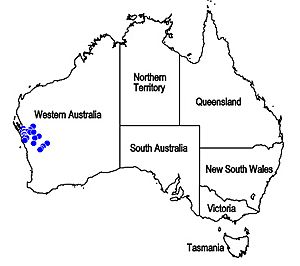Dicrastylis linearifolia facts for kids
Quick facts for kids Dicrastylis linearifolia |
|
|---|---|
| Conservation status | |
| Scientific classification | |
 |
Dicrastylis linearifolia is a species of plant within the genus, Dicrastylis, in the family Lamiaceae. It is endemic to Western Australia.
Description
Dicrastylis linearifolia is a many branched shrub, growing from 1 m to 3 m high, on red sands, on sandplains. Its stems are roughly circular in cross section, and have no peltate scales. The opposite and entire leaves are 15-40 mm long by 2-6 mm wide, whose upper surfaces have branched (dendritic) hairs. There are no bracteoles, but there are bracts which are 0.7-1. mm long. The flower stalks are 2.5-3.5 mm long, and have dendritic hairs, and peltate scale hairs. The calyx has five lobes (1-1.7 mm long), and is covered in dendritic hairs, and the white to cream corolla is 4.5-6.5 mm long, with no dots or stripes in its throat. There are five stamens. Flowers may be seen from November to December.
It is found in Beard's Eremaean and South-West Provinces.
Taxonomy
It was first described by Ahmad Abid Munir in 1978 as Dicrastylis linearifolia. There are no synonyms.


